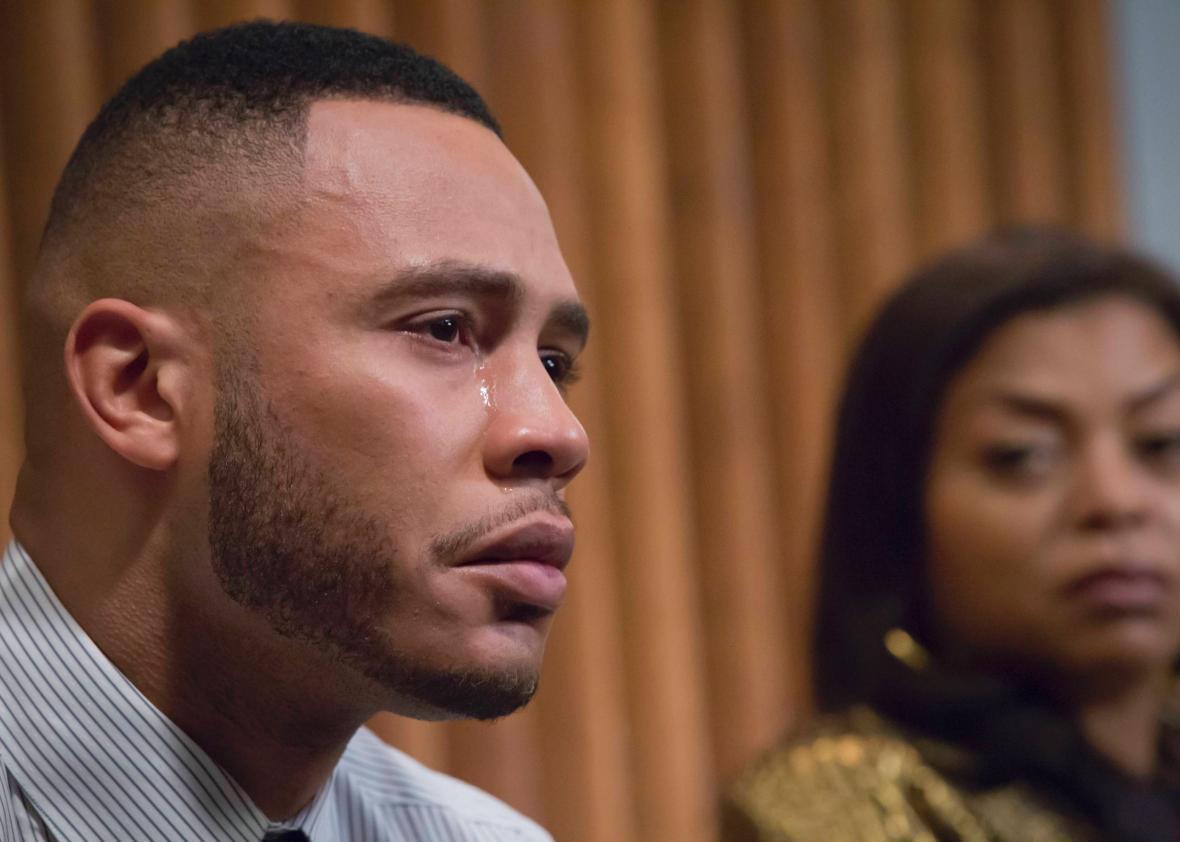One part of Empire’s bizarre Season 1 finale last year was concerning: the depiction of Andre’s bipolar disorder, which had been fairly accurate before that, began wading into some dangerously muddy moral waters. Having gone off his meds and experienced a breakdown, he decided to throw himself into religion and prayer in order to seek treatment. The problem, of course, is that religion and prayer alone are not proven to be able to treat extreme mental illness without some sort of medical attention accompanying them. Yet the writers seemed to lean hard into Andre’s commitment to faith as a cure for his mental illness without much skepticism, save for a few tossed-off lines in which his wife Rhonda expressed her own concerns.
As with many storylines and characters on Empire, Season 1 Andre’s illness has largely been forgotten in Season 2. His faith has only grown stronger and permeated nearly every aspect of his life in the meantime, though—he signs a rapper based solely on the fact that his stage name is religiously inspired, and he is baptized out of the misguided hope of being washed of his sins. Since Empire returned from its midseason hiatus last week, however, his bipolar disorder has crept back into the spotlight due to Rhonda’s miscarriage. They’re both devastated, of course, but Andre starts showing erratic characteristics similar to what he exhibited in the past: rash decision-making (in this week’s episode, “A Rose by Any Other Name,” he sells off his unborn son’s trust in order to buy back Mimi’s shares of the company) and an accelerated, stuttering speaking pattern.
This time, a very concerned Rhonda gets more opportunities than usual to coax Andre to see a doctor. Early on in “A Rose by Any Other Name,” Andre reveals that he’s had a “vision” that Rhonda’s fall wasn’t an accident and that someone pushed her down the stairs deliberately … which is a convenient hallucination, of course, considering that we’ve all seen a mysterious gloved hand do the pushing. Rhonda calls him “paranoid” and insists that he go to the doctor (which, well, makes sense). Andre insists that he’s taking his medication, but Rhonda has been here with him before.
She seems to be the only one in the family who grasps how dire the situation is. Everyone else notices the change in his behavior but tiptoes delicately around it: Cookie worries aloud if he’s returned to work too soon after losing the baby (and makes a major faux pas by referring to him, without thinking, as “crazy”—this is perhaps the only instance in which Cookie has apologized for a politically incorrect statement). Hakeem and Jamal take the High School Musical route and perform an inspirational pick-me-up they wrote together for Andre, because they “know you’re going through a hard time.” The pastor is no help, either—a counseling session in which Rhonda agrees to join Andre devolves into him accusing her of cheating on him, out of the blue. When Rhonda yet again insists that she’s only concerned about his health, the pastor adamantly pushes back: “God’s care,” he says, “is far more powerful than any doctor’s medicine.” (Er, not really.)
All the while, she keeps repeating over and over that he needs to recalibrate his medication in this particularly stressful period of his life, but no one, least of all Andre, seems to be listening. This divide actually feels believable—despite strides in public education, mental illness is still largely shrouded in stigma, particularly among the devoutly religious. And the black community can be even less likely to seek out medical attention for mental illness. (Arguably, the statistics do depend a lot upon financial access to medical services, but in the case of the fictional Lyon family, this is clearly not a roadblock.) The fact that Rhonda is the only one willing to fight this head on has as much to do with the fact that as his wife, she has the deepest understanding of his day-to-day habits as it does with the fact that she’s white.
It’s a good sign that, as the show returns to the subject of Andre’s bipolar disorder, Rhonda’s voice is becoming more prominent. Hopefully, the rest of the family will get on board, too, and his treatment and faith can, at the very least, co-exist in a healthy way—without reinforcing stigma against seeking medical treatment.
